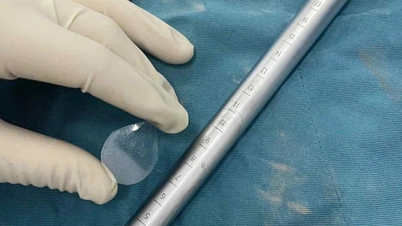Urinary incontinence is a health problem faced by millions of people around the world , especially older adults.
There are many causes for this condition, from the impact of diet, being overweight to some health problems such as constipation or overactive bladder, according to the health information site Everyday Health (USA).
To reduce urine leakage, people can apply the following methods:
Drink enough water

Each person should drink at least 2 liters of water per day.
Dehydration can increase your risk of bladder leakage. When you are dehydrated, especially if you do not drink enough water, the urine in your bladder becomes more concentrated. This irritates your bladder and makes you need to urinate more often.
Everyone should drink at least 2 liters of water a day. If you exercise, sweat a lot or it is hot, you need to drink more than 2 liters.
In addition, each person also needs to monitor the color of urine. Light yellow urine means that you are drinking enough water. If the urine is dark yellow, the body is dehydrated and needs to be replenished immediately.
Urinate even though not yet needed
Experts recommend that the longest gap between two urinations is 2 to 3 hours. After this period, even if you do not feel the urge to urinate, you should still go because it will help prevent bladder spasms.
Also, if you have to go out, urinate before leaving the house. Empty your bladder to reduce the risk of holding urine for a long time and causing leakage.
Pelvic floor exercises

Squatting exercises can help improve urinary incontinence.
Pelvic floor exercises such as squats and Kegel exercises can be extremely beneficial for people with urinary incontinence. These exercises help strengthen the muscles around the bladder, thereby preventing urine leakage.
Losing weight
Doctors recommend losing weight to reduce the risk of urinary leakage. Being overweight, especially if you carry a lot of fat around your abdomen, puts pressure on your pelvic floor muscles and contributes to urinary incontinence.
A study published in The New England Journal of Medicine found that women who lost 16 pounds or more in six months had a 50 percent reduction in urinary leakage. Meanwhile, those who lost 3.3 pounds had a 28 percent reduction in urinary leakage, according to Everyday Health.
Source link




![[Photo] President of the Cuban National Assembly visits President Ho Chi Minh's Mausoleum](https://vphoto.vietnam.vn/thumb/1200x675/vietnam/resource/IMAGE/2025/10/1/39f1142310fc4dae9e3de4fcc9ac2ed0)

![[Photo] Keep your warehouse safe in all situations](https://vphoto.vietnam.vn/thumb/1200x675/vietnam/resource/IMAGE/2025/10/1/3eb4eceafe68497989865e7faa4e4d0e)
![[Photo] Hanoi morning of October 1: Prolonged flooding, people wade to work](https://vphoto.vietnam.vn/thumb/1200x675/vietnam/resource/IMAGE/2025/10/1/189be28938e3493fa26b2938efa2059e)
























































































Comment (0)